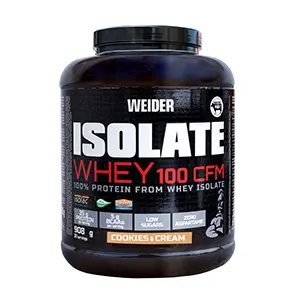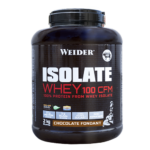When we look at how to know if protein is of high quality, we must look at several aspects. Protein quality is related to the number of essential amino acids (AA) in a protein molecule, i.e. those essential amino acids that we have to ingest through food because we cannot synthesise them.
In addition, in an athlete, the amount of BCAAs protein carrying capacity will be important for a optimal muscle regeneration after exercise, as they pass directly into the muscle. BCAAs are essential branched amino acids3 in particular: valine, leucine and isoleucine.
We can say that a higher quality protein will be the one that has more essential amino acids and also BCAAS if we are looking for optimal recovery of the athlete.
The content of vitamins is also important, as it brings benefits and more quality to the protein.
The biological value of proteins
A widely used index for measuring protein quality is the biological value (BV), which is the measure of the body's absorption and synthesis of protein from food intake. High biological value protein foods would be whey, milk, eggs, meats, egg whites, casein, whey protein...
The proteins of animal origin have a higher biological value than proteins from plant origin. Esto es debido a que las de origen animal, son proteínas completas, es decir, contienen todos los aminoácidos esenciales en cantidad suficiente. Por el contrario, las proteínas de origen vegetal son incompletas y no contienen todos los aminoácidos esenciales. No obstante, cuando combinamos dos complementary plant proteins (i.e. deficient in different amino acids), these are equivalent to a complete protein.
What about protein supplements? What should we look out for?
According to this the protein The highest quality protein would be the one with all the essential amino acids and which most closely resembles the composition of proteins with the highest biological value (egg or milk). If we look at the supplementation market, one of the most commonly used protein is the whey protein from whey, as it is of high quality. However, there are also proteins from eggs, meat and vegetable proteins.
Vegetable proteins
In the case of plant proteins we must ensure that they combine two complementary protein sources (legumes, seeds or cereals).

For example, pea protein or rice protein alone is incomplete. Pea is limiting in methionine and rice is limiting in lysine, but if we combine the two, they complement each other. This is the case of Vegan Protein by Weider, which by mixing both sources makes the protein complete. It also has a plus plant extracts and organic cereals that complement the nutritional profile of this protein.
Whey protein
These are proteins based on whey isolatewith a more complete amino acid composition, is characterised by its rapid absorption. You can find 100% proteins from whey isolate or mixed whey protein isolate and whey protein concentrate.

Among the isolated proteins we highlight the Isolate Whey 100 CFMIt is made using a mechanical cold extraction process that best preserves the natural properties of the product. It is enriched with digestive enzymes and the milk used comes from grass-fed cows. These additives increase the quality of the product.

For high quality protein concentrates we can recommend Premium Whey, con un 66% de concentrado de suero y un 20% de aislado, cuenta con 2 gramos de péptidos de L-Glutamine per intake to facilitate recovery and muscle development.
And if you prefer a pure concentrate, you can choose the Gold Wheywith easy absorption and digestion.
But Do we know if our brand of supplementation offers a quality product? Now we are ready to know how to choose our quality protein, and therefore our supplement. In conclusion, it will be up to us to read labels and check what type of protein we have in front of us and its composition (BCAAs).
Iratxe Echalecu and Belén Rodríguez
Sports nutritionists in Your Health Manager





